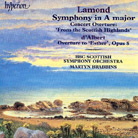May 2004
Both d’Albert and Lamond were Scottish by birth, and both made their careers in Germany. D’Albert renounced everything British and Germanized his given name. Lamond celebrated Scotland in his compositions, and he lived long enough to return to his native soil when World War II began. The three titles on this new CD appear to represent his entire output for the concert hall, and all are early works, since his growing importance as a pianist left him little time for creative activity once he was out of his twenties. The Symphony in A Major was composed in the mid-1880s, when Lamond was in his early twenties. Not at all surprisingly, in light of his identification with Beethoven (Lamond was an outstanding performer of Beethoven’s music, and produced his own edition of the 32 sonatas), the work is closely patterned after the model established by Beethoven. At the same time, though, it exhibits an admiring awareness of Brahms, who had recently introduced the last of his own four symphonies at about the time Lamond began work on his solitary one. No really memorable tunes, but it’s a handsome and substantial piece, in which there are more than a few reminders of the composer’s Scottish roots. The two shorter works are Scottish through and through, and perhaps more directly appealing than the symphony. The overture From the Scottish Highlands was conceived as a sort of tone poem on Sir Walter Scott’s Quentin Durward, and the Sword Dance is a straightforward Scottish reel from Lamond’s only opera, A Love in the Scottish Highlands. The skillful exploitation of the orchestra in these tuneful, evocative pieces suggests that Lamond might have been a significant symphonist if he had chosen that path. D’Albert composed no fewer than 20 operas, some chamber music and piano pieces, but little for orchestra other than a pair of piano concertos, the aforementioned symphony and the single piece on this CD: the Overture to Esther. This brief tone poem, written as an actual curtain-raiser for Franz Grillparzer’s drama on the tale of the Old Testament queen, shows the influence of both Mendelssohn and Liszt, and has a good deal in common with the descriptive overtures of Karl Goldmark. It’s an interesting opener here, if less fetching overall than the Lamond works. The entire program is performed with what we might regard as proprietary fervor by the BBC Scottish SO under Martyn Brabbins, and Hyperion has brought it to us with its characteristic care for both sound quality and comprehensive background material. GO BACK TO: |
 Lamond - Symphony in
A Major; d’Albert - Overture to Esther, Opus 8
Lamond - Symphony in
A Major; d’Albert - Overture to Esther, Opus 8 Now here’s
something you won’t have to worry about duplicating. Eugen d’Albert (1864-1932)
is remembered as a famous pianist, the composer of the opera Tiefland (which is
still performed in Germany), and the third of the four husbands of the legendary
Venezuelan pianist Teresa Carreņo -- who was the first of his six wives. His
contemporary, Frederic Lamond (1868-1948), was also a distinguished pianist, with a
somewhat less colorful but apparently happier personal life. Lamond is seldom referred to
as a composer, and neither he nor d’Albert is likely to be thought of as a creator of
symphonic works, but each in fact did write a few, including a symphony, though their very
existence was virtually unknown till the appearance of this CD.
Now here’s
something you won’t have to worry about duplicating. Eugen d’Albert (1864-1932)
is remembered as a famous pianist, the composer of the opera Tiefland (which is
still performed in Germany), and the third of the four husbands of the legendary
Venezuelan pianist Teresa Carreņo -- who was the first of his six wives. His
contemporary, Frederic Lamond (1868-1948), was also a distinguished pianist, with a
somewhat less colorful but apparently happier personal life. Lamond is seldom referred to
as a composer, and neither he nor d’Albert is likely to be thought of as a creator of
symphonic works, but each in fact did write a few, including a symphony, though their very
existence was virtually unknown till the appearance of this CD.